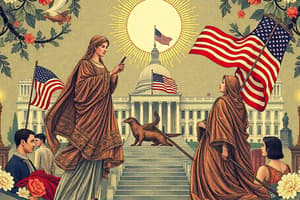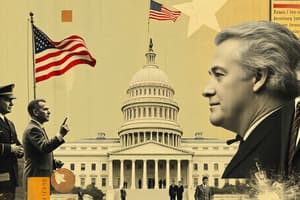Podcast
Questions and Answers
What does Locke argue is the primary reason for the existence of government?
What does Locke argue is the primary reason for the existence of government?
- To protect natural rights (correct)
- To enforce religious conformity
- To provide social order
- To distribute wealth equitably
In the state of nature, what rights did Locke claim people possessed?
In the state of nature, what rights did Locke claim people possessed?
- Natural rights (correct)
- Economic rights
- Political rights
- Civil liberties
Which political theory was developed by Montesquieu?
Which political theory was developed by Montesquieu?
- Utilitarianism
- Direct democracy
- Social contract theory
- Separation of powers (correct)
What is the purpose of checks and balances in government according to Montesquieu?
What is the purpose of checks and balances in government according to Montesquieu?
What fundamental principle of law did William Blackstone advocate for?
What fundamental principle of law did William Blackstone advocate for?
What is meant by 'precedents' in the context of common law?
What is meant by 'precedents' in the context of common law?
In cases of tyranny, what did Locke state the people have the right to do?
In cases of tyranny, what did Locke state the people have the right to do?
What aspect of government does the theory of separation of powers aim to address?
What aspect of government does the theory of separation of powers aim to address?
What is the primary difference between direct democracy and representative democracy?
What is the primary difference between direct democracy and representative democracy?
Which aspect of the Roman Republic influenced modern democratic governments?
Which aspect of the Roman Republic influenced modern democratic governments?
What fundamental rights did the Magna Carta attempt to define?
What fundamental rights did the Magna Carta attempt to define?
Why is the concept of separation of powers important in government?
Why is the concept of separation of powers important in government?
Which concept is associated with the idea of checks and balances?
Which concept is associated with the idea of checks and balances?
Which historical figure is closely associated with the development of individual rights in governance?
Which historical figure is closely associated with the development of individual rights in governance?
In modern democracy, the principle of representative democracy is best illustrated by which of the following?
In modern democracy, the principle of representative democracy is best illustrated by which of the following?
The concept of individual rights as established by documents like the Magna Carta contributed to which of the following?
The concept of individual rights as established by documents like the Magna Carta contributed to which of the following?
What was one significant principle established by the Magna Carta?
What was one significant principle established by the Magna Carta?
Which document directly drew influence from the principles of the Magna Carta?
Which document directly drew influence from the principles of the Magna Carta?
Which Enlightenment philosopher believed that a strong government is necessary to avoid chaos?
Which Enlightenment philosopher believed that a strong government is necessary to avoid chaos?
What concept did Montesquieu contribute to the development of government that is crucial for preventing tyranny?
What concept did Montesquieu contribute to the development of government that is crucial for preventing tyranny?
What was a common belief among Enlightenment philosophers regarding government authority?
What was a common belief among Enlightenment philosophers regarding government authority?
What did the Enlightenment thinkers emphasize as essential to individual rights?
What did the Enlightenment thinkers emphasize as essential to individual rights?
Which of the following concepts was included in Hobbes' social contract theory?
Which of the following concepts was included in Hobbes' social contract theory?
What principle plays a critical role in ensuring that the power of government is distributed and limited?
What principle plays a critical role in ensuring that the power of government is distributed and limited?
Flashcards
Natural Rights
Natural Rights
Basic rights people possess in a state of nature, prior to government.
Protect Natural Rights
Protect Natural Rights
The primary purpose of government, according to Locke.
Right to Overthrow Tyranny
Right to Overthrow Tyranny
People's right, in certain situations, to remove an unjust government.
Separation of Powers
Separation of Powers
Signup and view all the flashcards
Checks and Balances
Checks and Balances
Signup and view all the flashcards
Common Law
Common Law
Signup and view all the flashcards
Precedent
Precedent
Signup and view all the flashcards
Same Interpretation
Same Interpretation
Signup and view all the flashcards
Modern Democracy
Modern Democracy
Signup and view all the flashcards
Athenian Assembly
Athenian Assembly
Signup and view all the flashcards
Roman Republic
Roman Republic
Signup and view all the flashcards
Republican System
Republican System
Signup and view all the flashcards
Magna Carta
Magna Carta
Signup and view all the flashcards
Fiefs
Fiefs
Signup and view all the flashcards
Serfs
Serfs
Signup and view all the flashcards
Direct Democracy
Direct Democracy
Signup and view all the flashcards
Magna Carta principle
Magna Carta principle
Signup and view all the flashcards
Enlightenment effect on US government
Enlightenment effect on US government
Signup and view all the flashcards
Enlightenment philosophers' role
Enlightenment philosophers' role
Signup and view all the flashcards
Hobbes's social contract
Hobbes's social contract
Signup and view all the flashcards
Hobbes's view of the state of nature
Hobbes's view of the state of nature
Signup and view all the flashcards
Hobbes's solution to the state of nature
Hobbes's solution to the state of nature
Signup and view all the flashcards
Magna Carta's influence
Magna Carta's influence
Signup and view all the flashcards
Right to speedy trial
Right to speedy trial
Signup and view all the flashcards
Study Notes
Development of US Democracy
- US democracy is a modern version of older forms of government
- Ancient Greece's Athenian assembly was a direct democracy, where citizens voted on government decisions.
- Ancient Rome established a representative democracy, known as the Roman Republic, with elements like checks and balances.
- Feudalism involved kings granting land (fiefs) to nobles in exchange for loyalty and service, creating a hierarchical system.
- Magna Carta, an English document, established the principle that even kings were not above the law, influencing US Constitution and Bill of Rights.
Enlightenment
- Enlightenment philosophers, like Hobbes, Locke, and Montesquieu, influenced the Founding Fathers' ideas about liberty, natural rights, social contract, and popular sovereignty.
- Hobbes: Believed people naturally exist in a "state of war" and surrender rights for social order through a social contract, needing strong government.
- Locke: Argued people possess natural rights (life, liberty, property) and governments exist to protect those rights. He believed that people had the right to overthrow unjust governments.
- Montesquieu: Developed the idea of the separation of powers to prevent tyranny, dividing government into branches with checks and balances.
- Blackstone: Advocated for common law, where interpretations of law are based on past rulings.
Colonial and Revolutionary America
- Colonists established governments, influenced by their home country's traditions.
- Mayflower Compact expressed the concept of consent of the governed.
- Mercantilism, the British economic policy, aimed to increase England's wealth through controlling colonial trade.
- French and Indian War strained the relationship between Britain and the colonies, leading to increased British control.
Changes in Imperial Policy
- Britain imposed new taxes (Stamp Act) on colonies to pay for the costs of defending them after the French and Indian War.
- Colonial resistance to taxation, like "No taxation without representation," arose, culminating in the Boston Tea Party.
- Intolerable Acts, a series of laws, were imposed on colonies after the Boston Tea Party.
- Colonists protested the Intolerable Acts, culminating in the Continental Congress leading to the American Revolution.
Studying That Suits You
Use AI to generate personalized quizzes and flashcards to suit your learning preferences.




